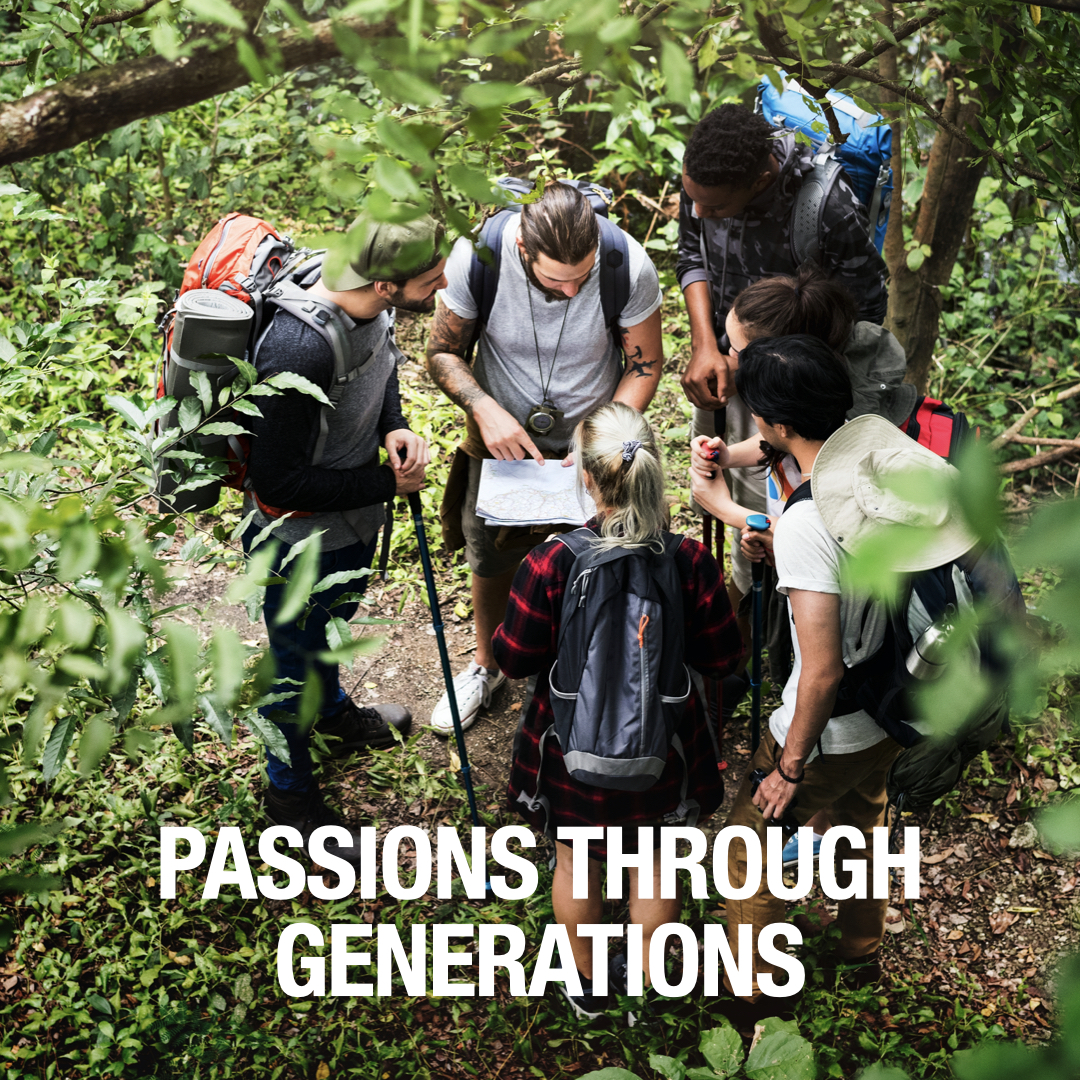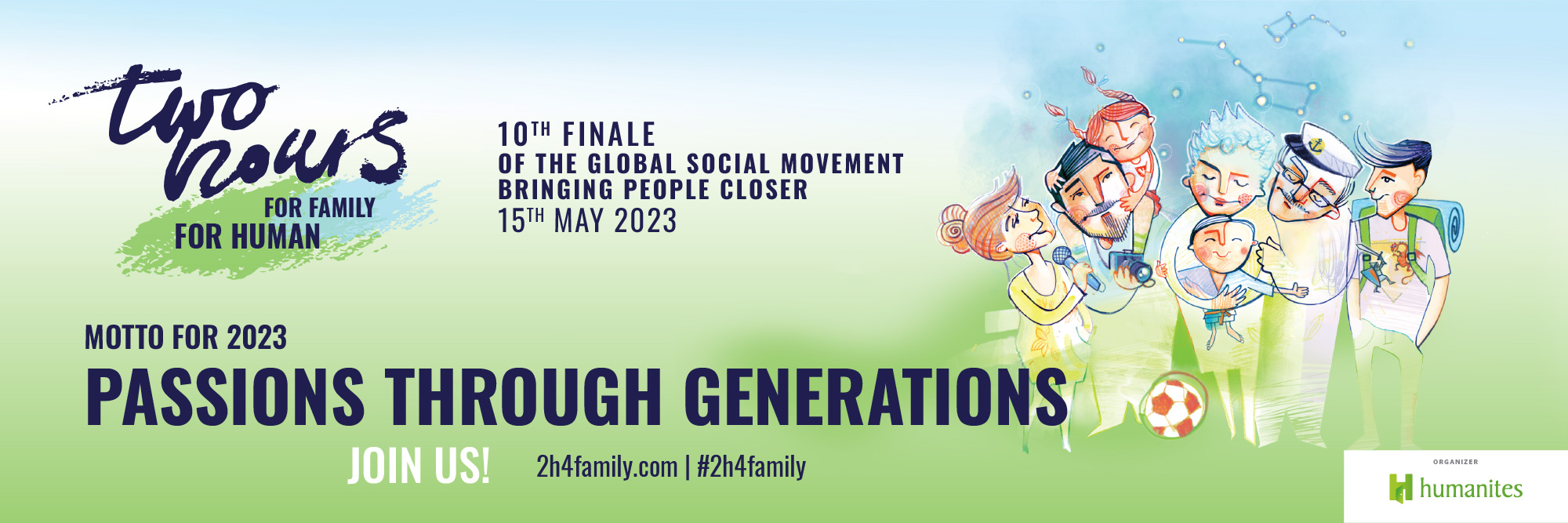Passions through generations!

Why should people share their interests with their loved ones? The theme of the XII edition of “Two Hours for Family | Human” is With passions across generations.
Our societies are full of passions – as many as 87 percent of us have a passion of some kind. The most frequently indicated are reading books, traveling and sports. Many of us are true music lovers – listening to music as our greatest hobby was indicated by 63 per cent of those surveyed.
Whether you devour books by James Joyce or Stephen King in your free time; whether you listen to your favourite Beethoven symphony; or whether you prefer to hop on your bike or go to the cinema for a good film, one thing is certain – in all probability you have a passion. And as we all know – passions unite, they also give you positive energy for work and life. Which is all the more important when looking at our physical and mental health: today already one in three people experiences loneliness or depression. That is why this year the Humanites Institute has chosen the motto ‘With passions across generations‘ for its flagship campaign ‘Two Hours for Family/Humanity’.
Against loneliness, depression and relationship crisis
Two Hours for Family/Human (#2h4family/4human) is the largest Polish action aimed at employers and employees. In 2022, after 11 editions, it reached over a dozen million people, and not only in Poland. Several thousand companies, institutions and local governments from as many as 59 countries around the world have joined the campaign! It is a Global Social Movement, initiated in Poland, for proximity and for changing work culture and lifestyles. In good working environments, employees show more commitment and less turnover. This year will see the finale of the 12th edition of the venture. This final will take place on 15 May, the UN-designated International Day of Families.
After Japan, the UK or Germany, other major economies are creating dedicated ministries and announcing systemic programmes to combat the loneliness pandemic – #2h4family/4human is a campaign that, ahead of the social discourse, aims precisely to counter loneliness, depression and the relationship crisis, as well as to encourage employers to build a good work culture for multidimensional human development, where companies can achieve their business goals and people have a sense of meaning and development. As Zofia Dzik, founder of the Humanites Institute, often says – there will be no change at the macro-social level if there is no change at the level of human-to-human relations. Employers undoubtedly play a major role in fostering such a change, as it is at work that we spend several or even more than a dozen hours a day. This action was indeed ahead of global ESG trends, particularly in terms of taking a broad view of the role of employers in developing social capital.
The organiser of the campaign, the Humanites Institute – Human and Technology, looks for a theme every year that would help integrate employees from different departments into one company, because building relationships within a team, which in turn will translate into good cooperation, in an era of remote or hybrid work culture, can be quite a challenge for employers. This motif is also becoming a pretext for intergenerational meetings within the family, for strengthening or even rebuilding bonds, searching for one’s roots. This time the key word is ‘passions’,” says Katarzyna Lorenz, director of communications and PR at the Humanites Institute, who coordinates the campaign.
Every year, #2h4family has its own ambassadors. This time, the actress Stanisława Celińska decided to support the campaign, admitting that her greatest and also family passion is music. The second ambassador, physicist and journalist Tomasz Rożek, unsurprisingly, is passionate about science. He is able to talk about it in such a way that there is a risk that a few people will become “infected” with this passion after hearing him speak.
You may not even know that you have a family passion
As already mentioned in the introduction, Stanisława Celińska’s passion for music is shared by the majority of Poles. Slightly less popular are activities such as watching films (indicated by 60% of respondents), reading books (55%), watching TV series (48%), cooking (39%), walking (37%), cycling (36%), reading newspapers and magazines (29%), taking care of animals (28%) and growing plants (24%).
In contrast, according to other studies, passions serve to take our minds off work – this benefit was indicated by 77 percent of respondents. And yet, there are times when we are able to earn money from our hobbies – as much as 39 per cent of respondents boasted such an achievement! If we could, most of us – 7 out of 10 people – would make our passion a way of earning a living.
It is not clear from the above survey whether we indulge in our passions alone or whether we share them with relatives. The fact that we like to spend our free time with those dearest to us is evidenced by slightly different data. It turns out that, according to the research, we most like to spend our time after work watching films and TV series with our family members (indicated by as many as 69 per cent of respondents) and, in general, spending time with children and family (61 percent). Perhaps we do not even realise that we are developing our shared, intergenerational passions in this way – what else is a family mushroom-picking expedition, watching our favourite sci-fi series with our son or daughter, playing chess with grandma or baking pizza together with dad?
A symbol that can make a big difference
Employers who have joined #2h4family have only one responsibility in participating in the campaign – around 15 May, they should encourage, inspire their female employees to spend time with their loved ones, but also use this time to integrate within the company, meeting person to person, not just position to position. Especially since, after the pandemic, many companies have been left in hybrid working mode, so there is less and less space left for people to get to know each other and build relationships. Most of the companies that have joined the movement are also implementing the optional request to give employees two hours off. It’s the perfect combination – employees will perhaps use it to indulge their passions, or perhaps – gift it to their loved ones. Best of all, the two possibilities are not mutually exclusive.
On the occasion of the International Day of Families, the Humanites Institute wishes us to successfully defend ourselves against loneliness and the bonding crisis. Two hours off is just a symbol that means little in isolation from the whole context. But if, during those two hours, you learn about your grandmother’s greatest passion – and maybe even discover that you share it – it will be a great success for the entire #2h4family campaign. Because many changes in life start with a small first step, the creation of a new ritual. That’s the experience Humanites invites us to by taking us out of the routine of our daily lives. The global success of the action, despite the scale of the development of new technologies and the number of ‘friends’ on social media, points to people’s simple longing for closeness, for not being anonymous at work.
More information about the campaign: www.2h4family.com
CAMPAIGN PARTNERS:
KROSS S.A., Bibby Financial Services, Great Place to Work, Fundacja Liderek Biznesu, Librus, Lider SHE, CERRAD sp. z o.o., ThinkTank, Reputation Managers, Wirtualna Polska.
COMPETITION PARTNERS:
KROSS S.A., Orange Polska, Kocham Skakać.
CONTACT:
Katarzyna Lorenz – Head of Communication and Public Relations, Humanites Institute.
e-mail: katarzyna.lorenz@humanites.pl tel.: +48 505 017 957
2h4family/4human is one of the key systemic projects of the Humanites Institute, alongside projects such as the Leadership Academy for Educational Leaders #APLO, the Centre for Technology Ethics or the regular conference for Business Leaders ‘Cohesive Leadership. People and Technology, which had its 10th edition in 2023.
Since 2010, the Humanites Institute – Human and Technology has been working in a systemic way as a think&DO tank for sustainable development and especially for the development of social capital, capturing the topics of humanity and technology in a broad context including, among others, business, education, culture, media and family, based on the author’s ‘Village’ model of Social Ecosystem Development™ and the Cohesive Leadership Model™. The Institute was one of the first to signal the impact of meta-phenomena such as the crisis of family ties, loneliness, infodemia or the algorithmisation of human life on people’s long-term economic development, motivation and physical and mental health. For the past decade, he has been promoting the development of a conscious and internally controllable human being able to meet the challenges brought by the technological and social revolution. He is also the founder of the Centre for Technology Ethics. Initiator of the annual “Two Hours for the Family” campaign. – Two Hours for Humanity, works for the development of key competencies through systemic change in the field of leadership in education by creating the Academy of Leadership for Educational Leaders – the first leadership development programme in education in Poland, implements in business the idea of Cohesive Leadership™, based on the multidimensional development of a leader and his team. Organiser of the annual conference for Business Leaders: Cohesive Leadership™. People and Technology. Humanites has for more than a decade supported the building of a high management culture, where business achieves its goals and people find a sense of meaning.
